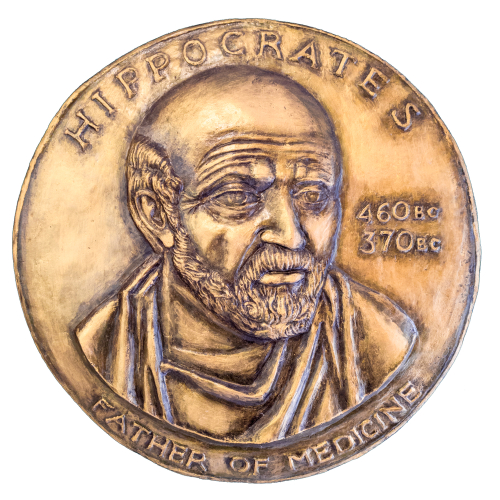Hippocrates of Kos, a renowned ancient Greek physician, made significant contributions to the field of medicine and laid the groundwork for modern medical practice.
Often hailed as the father of medicine, Hippocrates revolutionized healthcare through his ethical principles, observational approach, and holistic perspective.
He created the Hippocratic Oath, a code of ethics for physicians, and emphasized the importance of careful observation, disease classification, and maintaining detailed medical records.
Hippocrates advocated for a holistic approach to medicine, considering the physical, mental, and social aspects of a patient’s well-being. He proposed the theory of the four humors and focused on naturalistic explanations for diseases.
Furthermore, he recognized the significance of diet, lifestyle, prognosis, and the physician-patient relationship in delivering effective healthcare. Hippocrates’ accomplishments continue to shape medical practice and ethics to this day.
Accomplishments of Hippocrates
1. Creation of the Hippocratic Oath
Hippocrates is credited with creating the Hippocratic Oath, a code of ethical guidelines for physicians. This oath, traditionally taken by doctors upon entering the medical profession, emphasizes principles such as patient care, confidentiality, and the commitment to do no harm.
Also Read: Facts About Hippocrates
It sets a moral and professional standard for physicians, highlighting the importance of the doctor-patient relationship and the ethical responsibilities that come with practicing medicine.

2. Emphasis on careful observation and documentation of symptoms
Hippocrates stressed the significance of careful observation and detailed documentation of symptoms in patients. He believed that understanding the signs and symptoms of a disease was crucial for accurate diagnosis and effective treatment.
By meticulously observing patients, Hippocrates aimed to identify patterns and associations that could aid in the understanding and management of various illnesses.
3. Development of disease classification
Hippocrates introduced a systematic approach to disease classification. He categorized diseases based on their clinical manifestations and natural progression. This classification system was an important step in organizing medical knowledge and understanding the diverse range of illnesses.
By categorizing diseases into groups such as acute, chronic, endemic, and epidemic, Hippocrates laid the foundation for the taxonomy of diseases, which remains an essential aspect of medical practice to this day.
This approach helped in distinguishing between different types of diseases and understanding their common features and characteristics.
4. Advocacy for a holistic approach to medicine
Hippocrates emphasized a holistic approach to medicine, recognizing that health is influenced by various factors beyond just the physical body. He believed that a person’s mental, emotional, and social well-being were interconnected with their physical health.
This holistic perspective led Hippocrates to consider the individual as a whole, rather than focusing solely on treating isolated symptoms or diseases. He emphasized the importance of understanding the patient’s lifestyle, environment, and social context to provide comprehensive and effective healthcare.
5. Introduction of the four humors theory
Hippocrates developed the theory of the four humors as an attempt to explain the balance and imbalance within the human body. According to this theory, the body was composed of four vital fluids or humors: blood, phlegm, yellow bile, and black bile.
Each humor was associated with specific qualities and organs. An imbalance in these humors was believed to be the underlying cause of disease. Treatment involved restoring the equilibrium of the humors through interventions such as diet, lifestyle modifications, and herbal remedies.
While the four humors theory is no longer considered scientifically valid, it laid the foundation for understanding the body’s balance and served as a significant step in early medical thought.

6. Promotion of maintaining detailed medical records
Hippocrates stressed the importance of maintaining detailed and accurate medical records. He believed that documenting a patient’s medical history, symptoms, and treatment outcomes was crucial for advancing medical knowledge and improving future patient care.
These records allowed for the analysis of patterns, the assessment of treatment effectiveness, and the identification of factors that contributed to disease development or progression.
By emphasizing the value of medical documentation, Hippocrates encouraged a more systematic and evidence-based approach to medicine, laying the groundwork for the practice of medical record-keeping that continues to this day.
7. Focus on naturalistic explanations for diseases
Hippocrates rejected supernatural or mystical explanations for diseases and instead focused on natural causes. He believed that diseases originated from imbalances within the body or external environmental factors, such as diet, climate, or lifestyle choices.
By attributing diseases to natural causes, Hippocrates paved the way for a more rational and scientific approach to medicine. His emphasis on naturalistic explanations laid the groundwork for the understanding and exploration of the physiological and pathological processes underlying diseases.
8. Emphasis on prognosis and continued observation of patients
Hippocrates recognized the importance of prognosis in medicine. He believed that physicians should attempt to predict the course and outcome of diseases based on their observations and knowledge of similar cases.
Prognosis helped patients and their families understand the expected progression of an illness and make informed decisions about treatment options. Hippocrates also emphasized the need for continued observation of patients to refine prognoses and treatment plans, recognizing that the course of a disease could evolve over time.
9. Recognition of the importance of diet and lifestyle in health
Hippocrates acknowledged the significant impact of diet and lifestyle on an individual’s health. He advocated for a balanced and moderate approach to life, emphasizing the importance of a nutritious diet, regular exercise, and maintaining a harmonious relationship with the environment.
Hippocrates believed that these lifestyle factors played a crucial role in preventing diseases and promoting overall well-being. His emphasis on the influence of diet and lifestyle on health contributed to the development of preventive medicine and the recognition of the importance of lifestyle modifications in disease management.
10. Promotion of a strong physician-patient relationship
Hippocrates placed great importance on establishing a strong and trusting relationship between physicians and their patients. He emphasized the need for effective communication, empathy, and compassion in medical practice.
Hippocrates believed that a good physician-patient relationship was vital for accurate diagnosis, treatment compliance, and overall patient satisfaction. His emphasis on the humanistic aspect of medicine set the foundation for patient-centered care and the understanding that the emotional and psychological well-being of patients is as important as their physical health.
